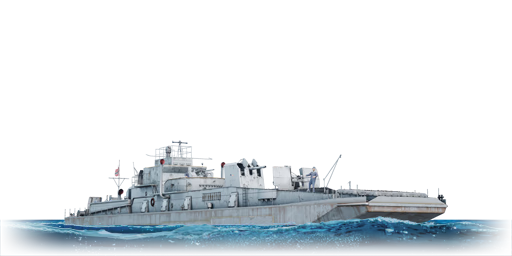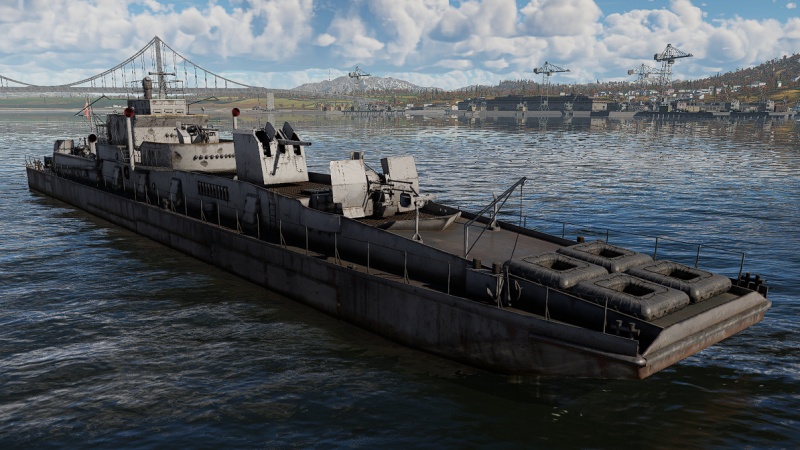AF D3
| This page is about the German barge AF D3. For the 88 mm version, see AF D1. |
Contents
Description
The Artilleriefährprahm Typ D3 (or AF D3 for short) was a variant of the MF Typ A landing craft converted into a makeshift gunboat after the planned invasion of Great Britain was cancelled. Due to the makeshift conversion plans between shipyards, each AF Typ D landing craft was outfitted with different kinds of armaments and armouring, such as different gun layout and extra concrete coating. The Typ D3, compared to the Typ D1, differed in its armament, featuring heavier 10.5 cm cannons instead of the 8.8 cm Flak cannons. In total, around 700 of AF Typ D of all variants were converted, and they were used either as an auxiliary minelayer towed along by destroyers, or used inland as a fire support gunboat.
Introduced in Update 1.79 "Project X" in the fleet closed beta test, the AF D3 is essentially the AF D1 equipped with larger 105 mm cannons and slightly different AA armaments. The AF D3 generally performs well as a fire support vessel, as the 105 mm cannons offer a major firepower upgrade over the D1's 88 mm Flak, since it is capable of hull-breaking various PT boats with ease, and even capable of going toe-to-toe against early destroyers. However, being originally designed as a landing craft, the AF D3 is completely lacking in mobility, and struggles to handle multiple enemies at once. As such, positioning and proper support is the key to success in playing this makeshift gunboat.
General info
Survivability and armour
Although the armour doesn't cover the whole boat, the survivability is not that bad, as it is a very long boat with lots of empty space inside for shells to go through. It is thus important that enemies with rapid-firing guns do not get too close to the AF D3 as they can riddle the entire boat with shells and hit critical components through the armour.
Staying far from the enemies and attacking them with the 10.5 cm guns is the best way to improve the lifespan of the AF D3.
Mobility
| Mobility Characteristics | |||
|---|---|---|---|
| Game Mode | Upgrade Status | Maximum Speed (km/h) | |
| Forward | Reverse | ||
| AB | |||
| Upgraded | |||
| RB/SB | |||
| Upgraded | |||
Like other German naval barges, the AF D3 has an abysmal top speed of just 20 km/h (RB) and very sluggish turn time. Due to the long hull design, the AF D3 has trouble navigating through various narrow passages and avoiding obstacles and incoming torpedoes.
Modifications and economy
Armament
Primary armament
The AF D3 has two 105 mm SK C/32 turrets as its main armament, which is a direct improvement from the 88 mm FlaK from its predecessor. It has higher explosive mass and penetration, with a fast reload time of just 4.64 seconds. The main gun can fire the following ammo types: HE (effective against most targets), HE with base fuse (effective against armoured targets), and HE-TF (for anti-aircraft purposes). The barges can carry up to 200 shells in total.
| Penetration statistics | |||||||
|---|---|---|---|---|---|---|---|
| Ammunition | Type of warhead |
Penetration @ 0° Angle of Attack (mm) | |||||
| 1,000 m | 2,500 m | 5,000 m | 7,500 m | 10,000 m | 15,000 m | ||
| Sprgr. L/4.4 Kpf.Z | HE | 20 | 20 | 20 | 20 | 20 | 20 |
| Sprgr. L/4.4 Bd.Z | HE | 42 | 34 | 25 | 20 | 20 | 20 |
| Sprgr. L/4.4 Zt.Z | HE-TF | 20 | 20 | 20 | 20 | 20 | 20 |
| Shell details | ||||||||||||
|---|---|---|---|---|---|---|---|---|---|---|---|---|
| Ammunition | Type of warhead |
Velocity (m/s) |
Projectile mass (kg) |
Fuse delay (s) |
Fuse sensitivity (mm) |
Explosive mass (TNT equivalent) (g) |
Ricochet | |||||
| 0% | 50% | 100% | ||||||||||
| Sprgr. L/4.4 Kpf.Z | HE | 785 | 15.1 | 0 | 0.1 | 1,550 | 79° | 80° | 81° | |||
| Sprgr. L/4.4 Bd.Z | HE | 785 | 15.1 | 0.015 | 5 | 1,550 | 79° | 80° | 81° | |||
| Sprgr. L/4.4 Zt.Z | HE-TF | 785 | 15.1 | 0 | 0.1 | 1,550 | 79° | 80° | 81° | |||
Secondary armament
The AF D3 is equipped with two 20 mm Flakvierling AA guns placed at the bridge and stern each. On the SF40 Light, these guns proved to be very effective against most targets the AF D3 might have to face. Due to the gun placement and two fewer gun mounts than the SF40 Leichte, it is somewhat less effective due to less concentrated firepower. However, it is relatively easier to target, as the two gun mount were placed directly frontally and in the rear (as opposed to SF 40 Leichte's diamond placement), this allows the AF D3 to hit the target frontally with relative ease.
- Universal: AP-T · AP · HEF-T · HEF
- 20 mm HET magazines: HEF · HEF-T · HEF · AP
- 20 mm APT magazines: AP · AP-T · AP · HEF
| Penetration statistics | |||||||
|---|---|---|---|---|---|---|---|
| Ammunition | Penetration @ 0° Angle of Attack (mm) | ||||||
| 10 m | 100 m | 500 m | 1,000 m | 1,500 m | 2,000 m | ||
| HEF-T | 2 | 2 | 2 | 2 | 2 | 2 | |
| AP | 36 | 35 | 27 | 20 | 15 | 11 | |
| AP-T | 36 | 35 | 27 | 20 | 15 | 11 | |
| HEF | 2 | 2 | 2 | 2 | 2 | 2 | |
| Shell details | ||||||||||||
|---|---|---|---|---|---|---|---|---|---|---|---|---|
| Ammunition | Velocity (m/s) |
Projectile mass (kg) |
Fuse delay (m) |
Fuse sensitivity (mm) |
Explosive mass (TNT equivalent) (g) |
Ricochet | ||||||
| 0% | 50% | 100% | ||||||||||
| HEF-T | 835 | 0.12 | 0 | 0.1 | 10.54 | 79° | 80° | 81° | ||||
| AP | 785 | 0.15 | - | - | - | 47° | 60° | 65° | ||||
| AP-T | 785 | 0.15 | - | - | - | 47° | 60° | 65° | ||||
| HEF | 835 | 0.12 | 0 | 0.1 | 10.54 | 79° | 80° | 81° | ||||
Anti-aircraft armament
A single 37 mm SK C/30 cannon is available in the anti-aircraft weapon slot for the AF D3.
| 3.7 cm SK C/30 | |||||||
|---|---|---|---|---|---|---|---|
| Ammo capacity | 2,000 | ||||||
| Fire rate | 30 rounds/minute | ||||||
| Reloading rate | 2 seconds | ||||||
| Vertical guidance | -10°/+80° | ||||||
| Horizontal guidance | ±180° | ||||||
| Targeting speed | 17°/s | ||||||
| Targeting vertical speed | 13°/s | ||||||
Additional armament
There are 4 WBD depth charges on the boat. These can be used as a close range weapon, although they only drop behind in your wake.
Usage in battles
Similar to the AF D1, the AF D3 excels in a fire support role. Try to stay at long ranges, where the guns and armour work good together. At close range try to angle or peeking, the downside is you will only be able to use the frontal or rear guns.
Depending on the enemy your face, some weapons on the AF D3 might be better than the others. Uses the 105 mm guns is preferred against enemy at long range or a large and/or well-armored vessel to deal high damage, while the 20 mm can be reserved for close-range engagements against faster and more manoeuvrable enemy.
It might be tempting to do a broadside with the AF D3. Be advised, however, that the AF D3's side armour is flat and became very weak when not angled, coupled with terrible mobility, this made you exposed to all source of incoming fire, including torpedoes.
Players seeking to defeat the AF D3 will try to close in from a blind spot or when the AF D3 is occupied with other opponents. Use the secondary armaments to deal with these fast-moving boats, as the main 105 mm guns would be too slow to react to new, close-by threats.
Pros and cons
Pros:
- 105 mm cannons are very effective against all kinds of targets, with high destructive power and quick reload time
- 20 mm AA cannons are very useful against fast-moving targets and aircraft
- Relatively good survivability when angled correctly
- High crew count
Cons:
- Terrible top speed and very sluggish to manoeuvre
- Large, slow targets makes it very vulnerable against bombs, torpedoes, and rockets
- In rough sea conditions, the 105 mm cannon's frontal line of fire can be obstructed by the 20 mm mounts
- While thick, the armour is quite flat, thus rendering the barge vulnerable from the boardsides
- Angling armour only allows some guns to be used in combat
History
The Artilleriefährprahm Typ D (Artillery Barge Type D) was a modified version of the Marinefährprahm Typ A (Marine Barge Type A), the largest landing craft class built by the Krigsmarine in World War II. Originally developed in 1941 for Operation Sea Lion, when the plan was cancelled, the barge found its usage in numerous roles it was originally not intended to throughout the war. Over 700 of the barges of various configuration was built.
AF Typ D
The AF D was a series of the Marinefährprahm Typ A modified into a makeship gunboat. The conversion usually varies depending on the shipyard and available materials. Typically, the barge is outfitted with two quadruple 20 mm anti-air cannon mounts, two single 88 mm flak cannons, and one 75 mm anti-air cannon. Although some barge were also outfitted with a 105 mm instead of 88 mm. The helm is moved forward close to the centre of the craft. The craft is often reinforced with armour around the superstructure and ammunition storage, and some have their bulwarks coated with 10 cm of concrete.
The AF D barges were primarily used as an escort and minelayer, towing along by other ships. Although some also found itself inland as an artillery support platform.
Media
- Skins
- Videos
See also
- Related development
External links
| Germany barges | |
|---|---|
| Anti-air ferries | SF40 Light · SF40 Heavy |
| Naval ferry barges | AF D1 · AF D3 |






